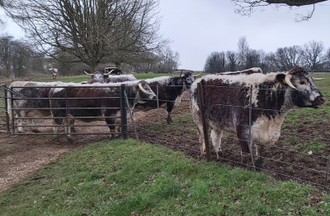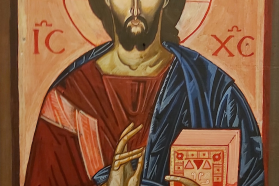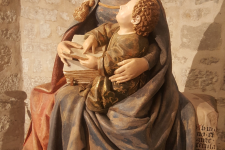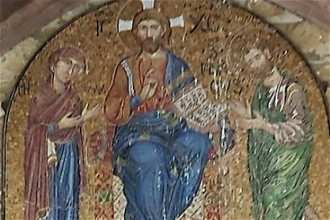Sunday Reflection with Canon Robin Gibbons - 21st February 2021

Longhorned cattle at Rousham, Oxfordshire
First Sunday of Lent
If ever there was a Scriptural passage to remind us of the connectedness between humans and creatures, this phrase from the first reading should be a wake up call: 'See, I am now establishing my covenant with you and your descendants after you and with every living creature that was with you: the birds, the tame animals, and all the wild animals that were with you-all that came out of the ark.'(Genesis 9: 9,10.)
I suppose because it is in the Old `Testament and hearkens back to the first Covenant God makes with humans, and we understand the new covenant made by Christ we may, in our religious zeal, forget that it is still in force, this magnificent promise made between God and all life remains. How then can this help us on our Lenten journey?
There is something all around us, present, hardly invisible, all too real, which we need to take note of, and that my friends are the effects of ecological pollution by humans and the resultant shift in climate change. Pope Francis and Patriarch Bartholomew have been urging the world to act, to pay attention and to care for a number of years now, in his Encyclical 'Laudato si', Francis used these words of Bartholomew to root our change of heart in a deeper spirituality; 'As Christians, we are also called "to accept the world as a sacrament of communion, as a way of sharing with God and our neighbours on a global scale. It is our humble conviction that the divine and the human meet in the slightest detail in the seamless garment of God's creation, in the last speck of dust of our planet". (Laudato si, 9)
The imagery here is very poignant, it takes us straight to the beginning of Lent, to the imposition of ashes, which in this year of the Covid 19 pandemic we have missed, and says to us in another way, 'Remember, you are dust and back to dust you shall return', a real remembering that in our essence and being we are made like the stars, connected to all life and to our earthly home in a way that is tangible. Running like sparks through stubble this Sunday are phrases which remind us we are not the only ones on earth, and certainly not the only things the Most High loves, the Covenant is not only with us, but with 'all living things'! Moreover we sin, the living creatures do not, and so they enjoy a different quality of love from the Creator, the love revealed in Jesus for the little ones in life.
It is our task and vocation to love them also, to cherish and care for them as loved by God and under the protection of the Covenant. We should note that spark of love in Mark's Gospel of this Sunday, Jesus in the wilderness, tempted by Satan was with the wild beasts who did not harm him. It may seem simplistic, and I confess to being an animal lover, but our attitude to nature, living creatures, domestic and wild often reveal much more than we think. This Jesus seems to accept the beasts, and certainly in Jesus we find that divine and human love for creation spelt out in his attitude so many times for us. It is wisely said that a person who is cruel to animals will also have that characteristic with humans, and there is a deep truth in that, because if we recognise our connectedness, that the Most High calls us to a wider vocation of concern, care and nurture beyond the limits of our human homes, to the wider home of earth.
So this Lent may we embrace that call to reengage with our planet and its life and to work as hard as we can to redress the wrongs we as humans have done, this is at the heart of our communion in Christ. 'All it takes is one good person to restore hope! The biblical tradition clearly shows that this renewal entails recovering and respecting the rhythms inscribed in nature by the hand of the Creator'. (Laudato Si . 71)
Lectio Divina
Words from St Isaac the Syrian
What is a merciful heart? It is a heart on fire for the whole of creation, for humanity, for the birds, for the animals, for demons, and for all that exists. By the recollection of them the eyes of a merciful person pour forth tears in abundance. By the strong and vehement mercy that grips such a person's heart, and by such great compassion, the heart is humbled and one cannot bear to hear or to see any injury or slight sorrow in any in creation. For this reason, such a person offers up tearful prayer continually even for irrational beasts, for the enemies of the truth, and for those who harm her or him, that they be protected and receive mercy. And in like manner such a person prays for the family of reptiles because of the great compassion that burns without measure in a heart that is in the likeness of God.
Pope Francis
Laudato Si
68. This responsibility for God's earth means that human beings, endowed with intelligence, must respect the laws of nature and the delicate equilibria existing between the creatures of this world, for "he commanded and they were created; and he established them for ever and ever; he fixed their bounds and he set a law which cannot pass away" (Ps 148:5b-6). The laws found in the Bible dwell on relationships, not only among individuals but also with other living beings. "You shall not see your brother's donkey or his ox fallen down by the way and withhold your help… If you chance to come upon a bird's nest in any tree or on the ground, with young ones or eggs and the mother sitting upon the young or upon the eggs; you shall not take the mother with the young" (Dt 22:4, 6). Along these same lines, rest on the seventh day is meant not only for human beings, but also so "that your ox and your donkey may have rest" (Ex 23:12). Clearly, the Bible has no place for a tyrannical anthropocentrism unconcerned for other creatures.
69. Together with our obligation to use the earth's goods responsibly, we are called to recognize that other living beings have a value of their own in God's eyes: "by their mere existence they bless him and give him glory", and indeed, "the Lord rejoices in all his works" (Ps 104:31). By virtue of our unique dignity and our gift of intelligence, we are called to respect creation and its inherent laws, for "the Lord by wisdom founded the earth" (Prov 3:19). In our time, the Church does not simply state that other creatures are completely subordinated to the good of human beings, as if they have no worth in themselves and can be treated as we wish. The German bishops have taught that, where other creatures are concerned, "we can speak of the priority of being over that of being useful".The Catechism clearly and forcefully criticizes a distorted anthropocentrism: "Each creature possesses its own particular goodness and perfection… Each of the various creatures, willed in its own being, reflects in its own way a ray of God's infinite wisdom and goodness. Man must therefore respect the particular goodness of every creature, to avoid any disordered use of things".


















